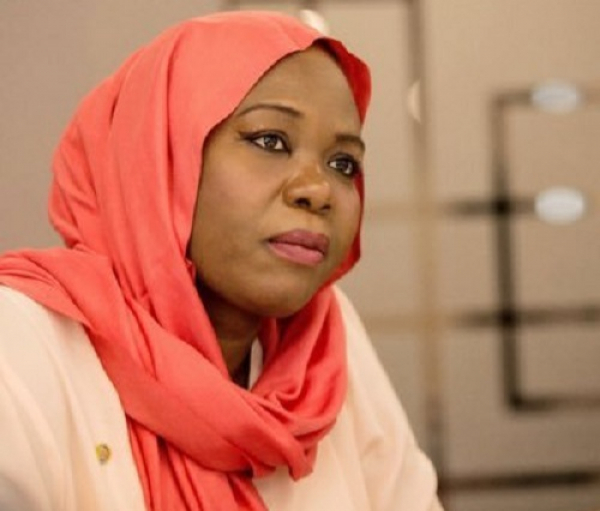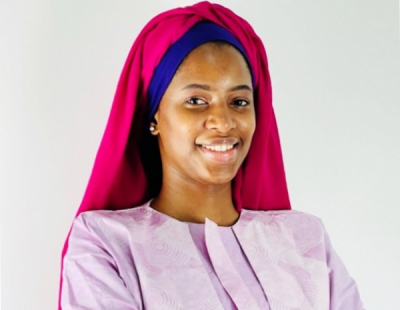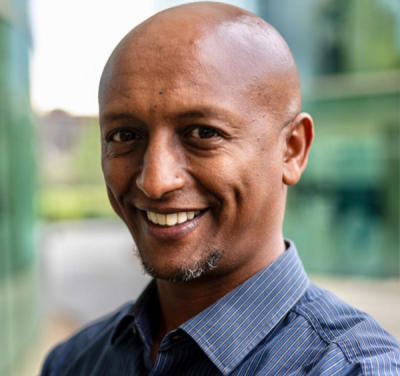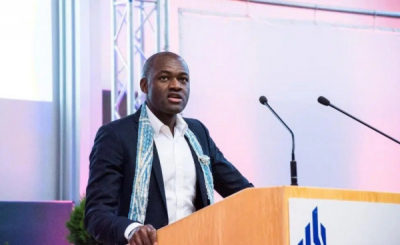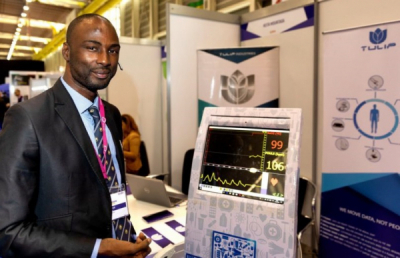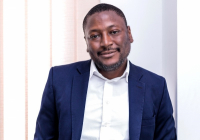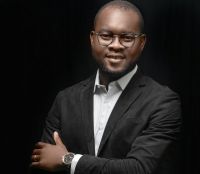
TECH STARS (1006)
With years of professional experience in the ICT industry, she is, since 2016, committed to the development of green technology.
Safia Mahamat Youssouf (photo) is the developer of Smart Village Chad, a green tech innovation hub. The innovation hub, launched in 2016, focuses on production, transformation, and support to young project owners, cooperations, and associations. It has three notable sections, namely an incubator (Sahel Green Hub), an experimental farm, and a research and development lab (AgriLab).
The developer is a telecom and computer science engineer who graduated from the Bamako Higher Institute Of Applied Technologies in 2002. She started her professional career in 2009 as a Value Added Services Supervisor for telecom operator Zain Chad. The following year, she was appointed Marketing Product Manager for Airtel Chad before leaving the Chadian Finance Ministry’s modernization project from 2011 to 2014.
In 2015, she joined the national ICT promotion agency as the director of research and planning. From 2017 to 2018, she was the director of communication and international relations for the Electronic Communications and Post Regulatory Authority (ARCEP).
Since 2018, she is the deputy CEO of telecom company Sudachad. In 2020, she made it to the Musodev list of the 21 women who shape the African ICT industry.
Melchior Koba
He is well aware of the challenges faced by most students in their student visa application process since he was once in their shoes. Six years ago, he decided to contribute his professional experience to help overcome those challenges.
Duplex Eric Kamgang (photo) is a Cameroonian entrepreneur and co-founder of Studely, a consulting firm that facilitates visa applications for students applying for admission to European Universities. The consulting firm assists students in the obtention of proof of financial support, accommodation research, travel or home insurance, and bank account opening.
According to Eric Kamgang, Studely is the result of personal experience. “... In 2009, I got admitted to a major business school in Paris. At that time, I thought everything was ready for me to travel to France and fulfill my dream but I soon realized how wrong I was because applying for a visa turned out to be a long and painful journey. [...] Apart from showing how motivated I was, I also had to prove I had enough financial resources, find decent housing in France, and purchase compulsory insurance policies. I had to do all this within days and, having no assistance, I doggedly did as I could in my native country,” he recounts.
Studely currently claims assistance to 10,000 students from 65 countries for their visa applications in France and Germany. The consulting firm founded in 2015 is already present in 15 African countries. It earned its co-founder, Eric Kamgang, several recognitions and awards, including Meet Africa 2016 and Digital Africa 2017.
Let’s note that Eric has a master's in finance and accounting from the Catholic University of Central Africa and an MSc in Management from the Skema Business School, France. He started his professional career in 2007 as a financial auditor for BACA Consulting, Cameroon. In 2020, he joined Total as a financial controller before subsequent positions in the financial and energy sectors in Germany and France.
Melchior Koba
The young data scientist is convinced that the effective exploitation of available data can positively affect company growth. She wants to prove her point through her marketing agency.
Mama Diagana (photo) is a Mauritanian data scientist and entrepreneur. In 2020, she co-founded Neotic, a web, and mobile marketing agency. Her agency provides clients with solutions to improve their visibility. The services it offers notably include web/mobile development, web hosting graphic design, data analysis and visualization, predictive marketing, digital marketing, and video production.
“As a data scientist … I realized that vendors had unexploited data that could have helped them improve their productivity and sales as well as develop a more efficient strategy,” she explained in 2021 while revealing the reasons that prompted the creation of Neotic.
The young entrepreneur, who has been a journalist for Slice Up Mauritanie in 2018 and a freelance sales representative (from March 2019 to November 2021), believes that Neotic can greatly contribute to the development of trade and the economy in Mauritania. Some stakeholders believe so too. Indeed, in 2021, the marketing agency was one of the 2021 Emerging Mediterranean awardees, winning a US$5,000 grant and a ticket to the Emerging Valley Summit in Marseille, France. The same year, it participated in the Social and Inclusive Business Camp (SIBC).
Melchior Koba
He has over twenty years of experience in the digital marketing industry. With his domestic service marketplace, he won the trust of thousands of clients and self-employed workers along with several awards and recognitions.
Ezana Raswork (photo) is an Ethiopian tech entrepreneur and founder of the digital marketplace Taskmoby. His marketplace currently connects home service providers (over 1000 registered on the platform) with clients (over 1500 jobs contracted through the platform) in Ethiopia.
The tech entrepreneur launched Taskmoby, in 2018, to help those who were previously unable to find qualified home service contractors for their various needs (plumbing, painting, electrical problems). Ezana is thriving in a domestic services market that is booming thanks to technology. However, Taskmoby is not his first venture. It is just a step in his professional and entrepreneurship career. He started his professional career in 1988 as a marketing manager for U.S consumer goods corporation Procter & Gamble. Twelve years later, he joined Canadian telephone service provider Fido Solutions as director of consumer marketing. From 2004 to 2007, he was the acting vice-president of marketing and vice-president of business development for the Canadian media company Yellow Pages. He was also the senior vice-president of Postmedia Network Inc., the publisher of Montreal Gazette, Ottawa Citizen, and Windsor Star.
In 2010, he founded Africa 118, a tech company providing digital marketing services to African SMEs. The company was perfectly aligned with his over 30 years of marketing experience. With Taskmoby, Ezana piqued the interest of several investment funds. In 2021, the startup was selected among the 50 beneficiaries of the Google for Start-up Black Founders Fund for Africa. Apart from the funds secured, making it to the list entitled Taskmoby to up to US$220,000 Google Cloud and Ads credit.
The services startup also won Ezana several awards, including the 2021 Eastern Africa Startup Awards. The startup was also selected by tech accelerator Baobab as the top Ethiopian company to watch in Africa and won the Best of Ecosystem Virtual Startup Pitch Series.
Melchior Koba
His professional experience, coupled with his background, helped him create a learning network that guarantees employment. The project has already earned international recognition.
Combine distance and face-to-face learning to allow access to quality and promising training for thousands of Africans. This is the feat achieved by Cameroonian Yanick Kemayou (photo), through Kabakoo Academies, the EdTech he co-founded in 2019 with Michèle Traoré.
Immediately after its creation, Kabakoo registered more than 12,000 learners. It is a network of learning institutions whose goal is to offset the shortcomings of conventional educational institutions that usually fail to equip students with the skills necessary to get decent jobs immediately after their courses.
“I decided to create that network because I was once the victim of the shortcomings of conventional educational institutions and the lack of opportunities in Cameroon,” explains Yanick Kemayou, a business administration Ph.D. holder.
Kabakoo’s pedagogical approach is designed to let learners develop digital fabrication and distributed manufacturing skills. The goal is not to develop state-of-the-art tech products and solutions for challenges faced by the immediate surrounding. It equips learners to either employ themselves or easily get a job after their courses.
Through its mobile app, Kabakoo allows access to several courses and mentoring from professionals working in prestigious companies like Google, Deloitte, Orange, and Oracle. The innovative learning model earned Kabakoo the "School of the Future" label, awarded by the World Economic Forum in Davos in December 2019.
Kabakoo is the result of its co-founder Yanick Kemayou’s professional and entrepreneurial experience. He started his professional career in 2008 as an assistant brand manager for L'Oréal in Düsseldorf, Germany. He later co-founded and managed the fashion company Clothing and Lifestyle Start-up, in Shanghai, China. Later on, he worked as a visiting scientist at HEC Paris, a research assistant, and a project manager at Paderborn University.
Melchior Koba
The former banker made a nice professional transition after twenty years in the U.S and France. Nowadays, his tech company positively impacts several sectors like public governance and health in his native country, Guinea.
Mountaga Keïta (photo) is a Guinean entrepreneur and founder of green kiosks manufacturer Tulip Industries Ltd. The tech company, launched in 2017, creates digital terminals for public and private actors, therefore supporting digitalization efforts.
For Mountaga, “with digitalization, there is no discrimination whatsoever and payment collected land directly where they are supposed to be.” He initiated the process for the creation of Tulip Industries in 2015 when he returned to his native country, Guinea, after twenty-three years in France and the USA. He finally launched the company in 2017, and, within a few years, it established credibility, won multiple contracts, and developed new products. For instance, it has already launched three terminals for the health sector (for cardiology, thermography, and ultrasound scanning). In early 2020, it won a contract to equip Guinean hospitals with its telemedicine terminals. The World Food Programme also ordered some of its products while various public administrations (the Rotama township namely) expressed interest in its green kiosks.
During the coronavirus pandemic, Mountaga Keïta built a telehealth tablet (Health Scan) equipped with a thermal camera and sensors that measure body temperature as well as the level of oxygen in the blood, and the heart rate. The data collected help identify Covid-19 positive cases and determine whether those cases required hospitalization.
Thanks to the innovative products developed by Tulip Industries Ltd, Mountaga has won several awards. He was for instance the winner of the 2017 Digital Week in Guinea. At the 2018 Africa Innovation Summit, he was named one of the top African innovators. The same year, he received the World Intellectual Property Organization (WIPO) gold medal. In 2019, he also received the gold medal from the French Inventors Association and the European Inventors Association Award.
All those achievements are the result of the strong professional experience he built with several financial institutions in the U.S. He has for instance been a senior banker for Bank of America.
Melchior Koba
In just six years, his fintech startup has gone from three employees to close to a hundred. It also won several awards and recognitions.
Idriss Marcial Monthe (photo) is a Cameroonian entrepreneur and co-founder of fintech startup CinetPay. The startup based in Abidjan, Côte d’Ivoire, allows companies and institutions operating in Francophone Africa to collect payments via mobile money, bank cards, and related financial solutions.
According to Martial, CinetPay is a convenient solution to the challenges faced by digital entrepreneurs when it comes to collecting payments. As he explains, online bank payment solutions are the most popular means but, they are not suited to the African market. Meanwhile, it was hard to integrate mobile money, which is possibly the most used payment means on the continent.
Currently, the platform plans to cover all of the 15 Francophone African countries by 2025. For that purpose, in December 2021, Martial announced a US$2.4 million seed funding secured from 4DX Ventures and Flutterwave. Gone are the days when the payment aggregator had to support its expansion plans with funds won during competitions and programs. According to the co-founder, in its onset, in 2016, CinetPay was supported by a US$5,000 grant from the Tony Elumelu Foundation Entrepreneurship Program. In 2017, it also won US$2,000 during the Euromena Awards organized in Abidjan, Côte d’Ivoire.
Thanks to the funds raised in December 2021, the fintech startup will expand its presence and become the leading payment aggregator in Francophone Africa. Its growth is to some extent due to the decade of professional experience garnered by Marcial in the African tech industry. In 2005, the same year when he graduated from ENSIT Côte d’Ivoire with a computer science engineering degree, he joined the e-commerce startup Cimarket, which went bankrupt in 2007. In 2009, he co-founded the e-services platform Cinetcore. Between 2015 and 2020, he was the manager of IT solutions company SOCITECH’s Veritas and Oracle business unit. Since September 2005, he is the manager of the Linux and freeware department of AI3L, an Ivorian non-profit association that trains young people in mobile technologies.
Melchior Koba
During his post-graduate studies in France, he witnessed the success of the ridesharing platform Blablacar and how it helped improve users’ traveling conditions. He later decided to replicate the success in Africa, while taking into account local realities.
Raynald Ballo (photo) is the founder and CEO of Raynis, a startup based in Abomey-Calavi, Benin. The startup specializes in the development of web solutions and supports clients in their digital transformation. Its founder made a name for himself in the African tech industry in 2021, with the launch of RMobility, a mobility platform.
RMobility is a ridesharing app that connects drivers who wish to share their empty seats with passengers who want to travel securely and cheaply. Currently, it claims over 10,000 ridesharers in Benin and Togo.
“... RMobility is first and foremost one of the modern solutions born from the digital revolution in Africa. [...] it helps save money, meet new people and maintain the social bond between members of RCommunauté [note: RMobility users] who are mostly young people,” Raynald Ballo explains. The tech entrepreneur adds that the solution helps the youth contribute to the reduction of green gas emissions.
The success of RMobility demonstrates users’ need for affordable mobility solutions. In that light, Raynald replicated the concept in the parcel delivery segment with RColis, a platform that allows the delivery of the RCommunauté’s parcels. RDigital was also created to develop web and mobile solutions to support clients’ projects.
Raynald's involvement in the mobility segment is the result of years of professional experience in that segment. He was a parking studies manager for the Urban Forum initiated by Sciences Po Bordeaux, France. He later worked as a researcher for ITEC Etudes, a consulting firm specializing in transportation and traffic surveys. He was also a mobility and transport project manager for travel agency Prêt à Partir and a parking study engineer for SARECO, a transport and mobility research company. Currently, he is a Ph.D. student in geography and planning in Nantes, France.
Melchior Koba
After trying times in the development of his first project, the young entrepreneur came to the limelight in 2016. Since then, he has rolled out several innovative solutions and won many awards.
The name Arthur Zang came to the limelight in the Cameroonian health sector in 2016 when he launched the production of Cardiopad, a connected electrocardiogram. The electrocardiogram is constituted of tablets and electrodes.
The tablets have many apps, including the electrocardiograph, which allows a complete cardiac examination. They also have the electrocardioscope that help record patients' cardiac activity and analyze them in real-time. The tablets also have a telecardiology app through which the various cardiac data recorded can be transferred to specialists for analysis.
Arthur Zang started working on a prototype in 2009. For the tech entrepreneur who grew up in Mbankomo, a small town located 20 kilometers from Yaoundé, the aim with Cardiopad was to find a solution to the low number of heart specialists in Africa.
To successfully carry out his project, in 2015, he was awarded US$45,000 (by Cameroonian President Paul Biya). He complemented the financial resources with the equipment received after winning the Microsoft Imagination Competition.
In 2021, Cardiopad was already used by 267 public health institutions in Cameroon. Some private hospitals have also adopted the solution. The tool is also used outside the national borders, in Gabon notably. Thanks to Cardiopad, the former chief computer engineer of the Catholic University of Central Africa (2013 to 2014) has won several awards such as the Rolex Foundation Prize in 2014, and the gold medal of the Africa Prize for Engineering Innovation in 2016.
During the Covid-19 crisis, the tech entrepreneur distinguished himself again with a new tool, the Oxynnet, a medical oxygen generator capable of producing 95% pure oxygen from ambient air. The generator, which can be controlled remotely, is connected to the electricity network or the solar panel used by hospitals. It allows them to produce 60 liters of medical oxygen every minute and supply at least 10 patients simultaneously.
Melchior Koba
He plans to become the banker of the African unbanked population. To achieve his ambition, his idea is to combine mobile money services, which are popular on the continent, with international financial tools.
Roger Nengwe Ntafam (photo) is a Cameroonian artificial intelligence engineer and the co-founder of fintech PaySika. The startup he co-founded in February 2020, with Stezen Bisselou facilitates money transfers through a mobile app that can be loaded with mobile money. It also allows users to manage their money in real-time from Facebook Messenger, WhatsApp, and Telegram and offers requesters free virtual cards for international or online transactions.
The entrepreneur explains that he got the inspiration for this payment solution from the tribulations his father, a shop owner, used to go through for stocktaking, accounting, and petty cash management. The main thing that pushed him to create the solution was the challenge he faced while trying to pay his tuition fees during his engineering studies at Paul Sabatier University, Toulouse, France. At the time, he did not have a bank account, and paying those tuition fees was a real challenge for him.
The startup claims over 20,000 users were registered on its waitlist during the pre-launch phase. In October 2021, it raised US$300,000 from British, French, and Nigerian investors to launch activities (in the first quarter of 2022). Its current target markets are Cameroon and Gabon.
Roger's professional and entrepreneurial journey began after a brief stint in the oil industry, working as an assistant operator for Exxon Mobile.
Before starting the PaySika adventure, Roger Nengwe Ntafam sharpened his entrepreneurial skills with MyMoney, which he co-founded in 2019. The startup created a chatbot that allows users to easily manage their finances.
But even before that venture, he developed many skills, in financial technology notably, with several research centers such as the North-East Midi-Pyrénées Multidisciplinary Research Laboratory (LRPmip) and the Artificial Intelligence Center in Prague, Czech Republic.
He also participated in various entrepreneurial support and tech innovation programs such as the first cohort of French Tech Tremplin, a high-impact entrepreneurial coaching program, in 2019. In March 2022, he joined the Founder Institute's Entrepreneur in Residence program.
Melchior Koba
More...
The tech and insurance entrepreneur has over fifteen years of professional experience in Europe and Africa. In 2018, he invested in two growth sectors: fintech and telecom namely.
Souleymane Gning (photo) is a Senegalese entrepreneur and telecom engineer. In 2018, he founded Assuraf, an insurance broker.
The aim of “Assuraf is to use online and offline communication medium to simply show Africans the inner working of the insurance sector to get them more exposed to the sector, understand its critical role and the coverage it offers,” Souleymane explains.
The insurance entrepreneur was able to successfully implement his project thanks first to his telecom engineering master’s obtained at the University of Poitiers, France, in 2003 and his over fifteen years of professional experience. He developed his professional skills in various companies, including SFR in France and Sonatel in Senegal, where he held his first management position from 2003 to 2006. He later became Cisco System’s Public Sector Manager for West and Central Africa and then Business Consultant Sicap SA (Swisscom). He also worked at Upstream, Persado, Sandvine and was a senior education advisor for EM Normandie Business School.
In 2018, the same year when he founded Assuraf, he founded eConnect, a telecom, media, and tech firm. The tech firm provides commercial tech solutions in Sub-Saharan Africa.
Melchior Koba
Six years ago, he decided to put his IT skills and international professional experience at the service of African countries. Today, he has several clients and awards thanks to the solutions he developed to help combat environmental crimes.
Badr Idrissi (photo) is a Moroccan entrepreneur and co-founder of tech startup Atlan Space. The startup, launched in 2016, builds artificial intelligence solutions to pilot fixed-wing drones. It aims to help African countries have affordable surveillance equipment to combat environmental crimes, illegal fishing notably.
In an interview with Médias24, Idrissi explained that some countries, African notably, did not have tech solutions to effectively monitor and protect their oceans and fishery resources while "developed countries use several powerful tools, including light aircraft, satellite surveillance and other tech tools that cost millions, even tens of millions of dollars,” for the same purpose. His aim through Atlan Space is therefore to help monitor large geographical areas for the identification of anomalies or environmental threats to human health.
In 2021, Badr Idrissi successfully raised 10 million dirhams (US$1 million) to expand his startup’s intervention sector to include deforestation, desertification, and illegal mining. Last February, the startup also launched a new product.
For Atlan Space's contribution to the environment, Badr Idrissi has received several awards, including the Marine Protection Prize from the National Geographic Society and the African Entrepreneurship Award. This year, Atlan Space was one of 45 start-ups competing for the AfricaTech Awards organized during the 2022 edition of Viva Technology from June 15 to 18.
Melchior Koba
He started a tech entrepreneurship venture to improve the quality of healthcare in Africa. Barely seven years later, he is one of the influential figures on the global healthTech scene.
Imodoye Abioro (photo) is a Nigerian doctor, entrepreneur, and self-taught IBM Cloud software developer. He is the founder of Healthbotics Ltd, a health tech whose stated mission is to “solve Africa’s perennial healthcare challenges.”
The young doctor and entrepreneur started Healthbiotics following the death of his best friend who bled to death in the emergency room where he was working as a Doctor-on-call. “...that loss almost broke me and so I was motivated to do something about some of these perennial problems facing our hospitals and care delivery system,” he told Pan-African Visions in an interview in 2021.
To fulfill its mission, with Abioro at the helm, Healthbiotics developed two flagship products notably Mediverse and Lend an Arm. The first is a digital AI-powered health record backed by blockchain technology. It allows doctors and nurses to record patients’ health information “with just their voice, eliminating the endless need for writing and typing.” The second product was created in 2017 to connect blood donors and hospitals with blood banks. With that mobile and web AI-powered solution, blood donors and recipients can chat, organize, or join a blood donation campaign. They can also find the nearest blood bank.
The two products earned Abioro several awards in 2020, including the AI for development Challenge, the Young Innovator Award at the World Summit Awards, and the African App Launchpad Cup. In 2021, he was one of the winners of the African Young Innovator Award for Health.
Apart from Healthbiotics, he also co-founded Bimi Online for Africa (in 2018), a health information aggregation platform that he served until December 2019 as the Chief Technology Officer. He was also, from 2019 to 2020, the Chief Technology Officer of Future Food Project, a startup committed to “ending malnutrition in Africa.”
Melchior Koba
By training, he was destined for a career in public health and epidemiological surveillance. However, he chose digital entrepreneurship. Nowadays, he is a startup builder whose ambition is to develop effective solutions for well-defined needs in Africa.
Amos Avoce (photo) is a Beninese digital entrepreneur and founder of 229Founders, a startup studio he launched this year. In his own words, “229Founders is neither an incubator nor an accelerator or a coworking space. It is a startup builder.”
“Incubators and accelerators incubate startups but 229Founders creates startups,” he stresses. Through the startup builder, Amos, and his team identify needs that can be addressed with lasting and efficient tech solutions. They then issue calls for expression of interest for co-founders interested in creating solutions for those needs, back the startup in charge of addressing the needs (they take stakes in those startups) from creation till the marketing of the solutions created.
Amos is not a newcomer in the Beninese tech ecosystem. In 2017, he had already co-founded Bénin FinTech (BFT), a startup guiding financial institutions in their digital transformation. BFT notably developed SmartPay, a fintech solution that allows microfinance institutions to digitalize their savings and credit issuance processes. The startup also developed SmartAgri, a system facilitating agricultural credits.
The young social entrepreneur is a graduate of the University of Parakou’s National School of Technicians in Public Health and Epidemiological Surveillance (in Benin). In 2011, one year before his graduation, he joined Give1Project, an NGO dedicated to “building strong and healthy communities.” He is, since 2013, the country manager for ADS Group, which “designs and implements solutions to help develop Africa.”
He also actively participated in the deployment of the Akon Lighting Africa project started by Senegalese-American singer Akon.
Melchior Koba


